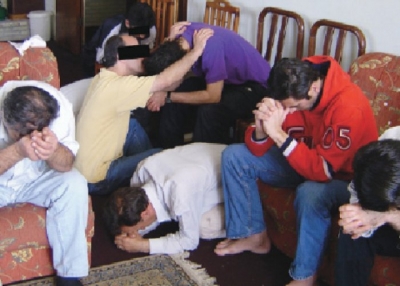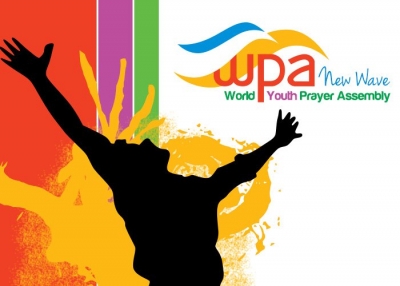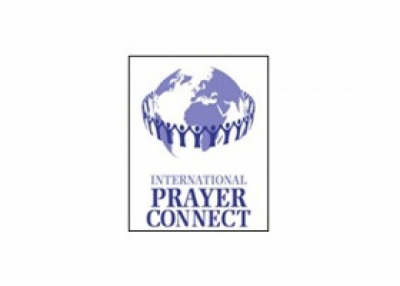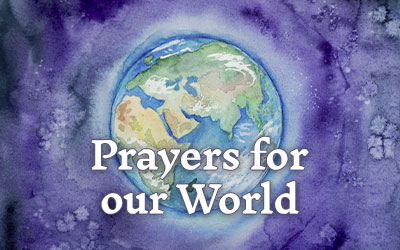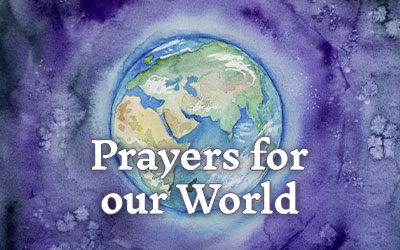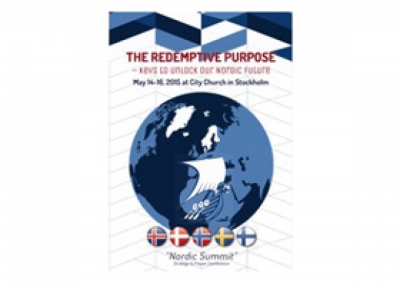“A major spike in the harassment and arrest of Iranian Christians in recent months is revealing just how nervous the Islamic republic is about the prodigious success of house churches, say Iranian Christian leaders. At least 202 Christians in 24 cities faced "arbitrary" arrest between June 2010 and January 2011, according to Elam Ministries. Elam, run by Iranian expatriates, counted 80 arrests over 2008 and 2009 combined. "[Iran] has been substantially more public in its oppression of Christianity," said Todd Nettleton, a spokesman for Voice of the Martyrs. "Announcing it on the news, having the mullahs talk about it in their Friday sermons—it's just become a lot more out in the open." "Persecution has escalated to an unprecedented level," said Abe Ghaffari, executive director of Iranian Christians International.
While Iran's historic Armenian and Assyrian congregations usually enjoy freedom of worship, Farsi-speaking house churches hosting converts from Islam work under significant threat. … The government is concerned, observers say, because more and more Iranian Muslims are converting to Christianity. The house church movement is booming, with converts estimated in the hundreds of thousands. Evangelists are distributing large numbers of New Testaments, and satellite television continually beams Christian programs into the country. "The government always used to deny that Iranians become Christians," said Elam's David Yeghnazar, but now the church has become too strong to ignore. Supreme Leader Ayatollah Khamenei declared the house church network "enemies of Iran" in an October speech, which analysts labeled a rare public acknowledgement of the movement. …
Resentment against the reigning regime is spreading and deepening—especially since the disputed 2009 national elections. … "The Iranian public basically doesn't trust the government anymore," Ghaffari said, "and they don't trust the Muslim clergy anymore, because they have seen a lot of double standards and hypocrisy." Converts in smaller communities still risk persecution from their own families, but tolerance is growing in urban areas and among the younger generation. "In fact," said Dibaj, "in places like Tehran and more educated communities, if you say, 'I have become a Christian,' they will respect you because of your courage and your independent thinking." If anything, government persecution has made Christianity much more attractive, said Yegh-nazar. "When government officials are on television telling people not to read the Scriptures, that generates more interest in the Scriptures."
Excerpted from Christianity Today, June 6, 2011.
Lord, let your Gospel continue to speed on and triumph throughout Iranian society! Please strengthen and protect your workers who are bearing the brunt of the opposition by political and religious authorities.
Anyone who has attempted to listen to two (or more) conversations at once can relate to a question my son asked when he was about nine years old. As he was preparing for bed one night and about to pray with his mom and me, he looked up with a puzzled expression. "How can God listen to my prayers if millions of other kids are praying right now too?"
My guess is that many adults have pondered this same question without venturing to voice it, though occasionally I meet someone curious enough or brave enough to ask it aloud. What thrills me about this query is that it opens the door to some profound theological truths that can expand our view of God's transcendent splendor and assure us of His personal, undivided attention to our prayers! These truths can draw us deeper into trust and worship of Him.
Because we humans experience time as a single, one-directional "line" along which our physical life progresses from beginning to end, we can only communicate with one another sequentially, one after another. Thanks to remarkable advances in technology, we can now communicate simultaneously with a global audience almost as easily as we can with one friend standing in front of us. With or without technology, however, we cannot handle overlapping conversations any more than we can read two pages in two different books at the same moment and with full attention to each.
By contrast, the God who brought this universe into existence and continuously holds it together is not and cannot be contained within it. According to Scripture, God existed and acted "before the beginning of time" (2 Timothy 1:9; Titus 1:2). By His transcendent power and purpose, He created not only matter and energy but also the space and time in which matter and energy unfurl (Genesis 1:1; Hebrews 11:3). Both the Bible and scientific investigation present us with the reality of a Being who has the capacity to create our familiar time dimension and fix its direction, a Being who possesses unlimited time capacities!
For the sake of our limited imagination, however, let's consider what is possible for God if He were to access even just a two-dimensional time frame. If we liken time dimensions to space dimensions, we can picture this two-dimensional time frame as a plane of time, a flat sheet with length and width, something like an edgeless sheet of paper. On this plane, God can extend a perpendicular time line from any point, any moment, along the time line you and I are moving along. On this perpendicular time line, God can give individual, undivided attention to your words and my words-and to any number of other prayers simultaneously. None of us need be concerned that our words will be drowned out. And in this moment, in this communication, we are being heard and attended to by the all-powerful, all-knowing, all-loving Creator of the universe, our Savior and Lord. This is why I consider prayer as the most potent spiritual resource God has granted to us humans. Our link with Him is more direct and constant than any high-speed Wi-Fi connection!
Obviously God has options far beyond this notion of a time plane. He can create and access time dimensions, as well as space dimensions, at will. What's more, He is free to operate without any limitations at all, completely independent of space-time dimensions. However, this simple illustration can at least offer us some reassurance that God truly can and does attend to us at every moment and in every situation of our life. Sometimes I go so far as to imagine our prayer lines resonating in some special way when we pray in unison or in harmony with fellow believers! Whatever the case may be, this illustration gives new meaning to King David's burst of joy and wonder:
How precious to me are your thoughts, O God!
How vast the sum of them!
Were I to count them, they would outnumber the grains of sand.
(Psalm 139:17-18)
Note from the editor:
Dr. Hugh Ross and the Reasons to Believe Ministry (www.reasons.org) that he founded carry on one of the most strategic ministries in the world both to skeptics and believers. He and his scientist colleagues share the increasingly astounding results of modern science that demonstrate so powerfully and mind-bogglingly the existence and attributes of our almighty, all-loving and all-wise Creator. Please pray for this unique ministry according to these requests that RTB has sent to us:
1. Sufficient fiscal year-end donations to fund the "good works" God has "prepared in advance for us to do."
2. Wisdom in developing plans for both our Conference Center and media studio.
3. Spiritual discernment and impact in our interactions with another ministry with which we are striving to dialogue .
4. Development of kingdom-advancing ministry partnerships.
5. That God will keep us safe AND make us dangerous!
Here is some of the latest thinking from the International Dream Team of the WYPA. Please feel free to give suggestions to the planning team.
1. We will initiate on 2016 and culminate on 2017.
2. It will be a full-year event.
3. We will pursue this regardless of seeming conflict with other global events; we see it as complementary to all gatherings.
On UPRISING 2016
1. We will mobilize for an "UPRISING DREAM TEAM" - mobilizers, organizers, trainers, to work toward UPRISING 2017
2. We will recruit young, like-minded, global leaders who are ready to pray.
3. Attendance can go from 300 to 5,000 or more. We will not set a limit.
4. We will treat the preparations for this as if there is no event on 2017.
5. We will incubate and synergize, soak and seek, relate and bond.
6. We will receive impartation from the older leaders from all walks of society.
7. We will cast a global vision of UPRISING.
8. We will "resist in prayer" the growing evil in our times, especially the attack on Christians.
9. We will believe for fresh anointing on the youth and children in prayer, starting their own prayer movements.
10. We will ask the UPRISING DREAM TEAM to do an UPRISING prayer gathering monthly for 12 months in order to build momentum for 2017.
11. For mobilization of Koreans: we will maximize the potential of mobilizing "Korean Diaspora Churches" to call for sort of a 'homecoming' for the Koreans.
12. We will dovetail on other global gatherings between July 2016-2017 not to compete, but to complement their respective visions.
13. We will send the delegates home to gather a generation: "See you in UPRISING 2017"
On UPRISING 2017
1. This will be exponentially bigger than 2016.
2. We will pray, seek God, and hunger for Him.
3. We will hear from and pray for every region.
4. We will research on and pray against every attack the enemy has released in this generation.
5. We will challenge all delegates to a global fasting and praying for revival, for a new Jesus Movement in the Digital Age.
6. We will challenge the generation/s represented to commit to a personal vision of transformation in the 7 Mountains of Culture.
7. We will give a "packet" to all attendees with how-to's on mobilizing, organizing, and starting an UPRISING in every nation and region.
Dates
We are looking at JULY 25-30, 2016.
-July 26-28 will be the 3-day kick-off.
-July 29 will be the Prayer Time at the DMZ border.
-July 30 will potentially be a stadium event to rally the Korean churches and prayer movement.
For more information or to give suggestions, please contact Pastor Jerome Ocampo care of the WYPA administrator Sarah Torres at This email address is being protected from spambots. You need JavaScript enabled to view it.
Please pray for His continued clarity, unity and wisdom for the planning team; for the finding of the appropriate venue in South Korea; effective connection and mobilization with youth prayer and mission movements worldwide; and for His provision of all the resources needed.
In our IPC leadership call today, June 2, many exciting reports were shared about the way the Lord is moving through His praying people and especially the younger generation. Pl ease join us in prayer for these key concerns:
•Rise-Up Arab European Prayer Conference, May 14-16, Wiesbaden, Germany- An exhilarating event with 300 on-fire Arab Christians from many nations of Europe. They were challenged not to behave like refugees but as missionaries and to establish prayer cells wherever they are in the continent. Pray that they will be effective intercessors and mobilizers and that this movement will grow and connect many more immigrants, connecting them with nationals.
•RESET Million-Youth Prayer Event Leaders' Gathering, June 11-13, Washington, DC, USA the organizers have asked others to give them input in planning this massive prayer assembly for next year in July. Pray for great wisdom in doing this well and that there will be an enormous response by the younger generation across North America and elsewhere.
•UK Trumpet Call National Day of Prayer, July 4- it will be held in a 3000-person auditorium in Birmingham and will focus on the supremacy of Christ and the unity of His Body. Much spiritual battle and accidents occurring so please keep the leaders very much in prayer. May it be a powerfully anointed event that will rock England for the Lord and change the atmosphere politically, culturally and spiritually!
•International Children's Intercessors Conference (Royal Kids), August 6-9, Chennai, India- the organizers have been going through significant persecution and difficulty. Please pray for His grace and favor for them and their colleagues and for His provision of a good venue where they can hold this important initiative for the children.
•Global Issachar Group, South Asia Region, August 11-14, Colombo, Sri Lanka- Focus on the dark places and powers of our world. Pray for the right participants from the region, who have wisdom and experience to share that they will be able to come to Sri Lanka without hindrance and that it will be a revelatory, valuable time for all. Pray for the organizers as they make preparations and for His provision of resources for all the costs.
•European Trumpet Call, August 31-September 4. Pray for the leaders and for participants to come from across the continent to hear from the Lord and pray out His heart for the revival and transformation of Europe.
•24-7 Prayer Movement- their call is to concentrate on the 18 to 25 year old generation, "reviving the Church, rewiring the Culture" with the overflow of prayer into mission and justice initiatives. Pray for their effort to "turn the tide of modernism" on the university campuses and for a strong response by the students to be called by the Lord and become His leaders of tomorrow.
•Children in Prayer international team-Pray with them to see movements of CiP develop across the world and get connected and for how the children should participate during the WYPA.
•Kumbh Melah of Nasik, India- 60 million Hindus are expected to take part in this empty, vain ritual of river-dipping to get salvation, July 15 to end of September. Intercessors will pray there for 100 hours before. Pray that the powers of darkness and deception will be bound, that the KM will be a bust, and that millions will instead hear and respond to the glorious gospel of our Lord.
•Caribbean Prayer Network- please pray for the "Cry Out for Children" event on June 27 in Jamaica that will focus on child abuse and atrocities, a book on intercession being released and a course for intercessors that will be offered July 6-17.
•Africa- thanks be to God and the intercessors that prayed for Nigeria, which had an uncommonly smooth and peaceful election! Pray for efforts being made through MANI to coordinate prayer across the continent and their gathering October 26-31 in Addis Ababa, Ethiopia to pray for the unreached peoples as well as the issues of Islam and terrorism.
Thanks for standing with us in prayer for our world!
It seems that there is a growing divide in North Korea between the donju who have money and the rest of the population. Donju are the newly affluent and growing middle class but in the North it is hard to speak of a middle class since the divide is so great. Anyway, they are able to buy their way out of undesirable work like the army and the "spring battle" that requires everyone to get out into the fields and plant. (The North has set up up another tension by upgrading schools from fines for skipping out.) They are strongly focused on owning the latest South Korean goods, including the best cosmetics, and this despite the increasing crackdowns. The growth of this class that increasingly flaunts authority may also be adding to Kim Jong Un's sense of insecurity. He recently executed his latest defense chief, Hyon Young Chol--by antiaircraft fire. This is only the latest in a long string of purges that reflect this. This insecurity and his inconsistencies (e.g. canceling UN Security-General Ban Ki Moon's visit) are of grave concern.
Kim Jong Un is also quite concerned about the ongoing communication between North Koreans and relatives who have made it to the South. He has been tightening up and call volume is dropping.
There is much in the news these days about North Korea that should fuel our prayers. We have also learned that the long arm of ISIS has also touched North Korea in the kidnapping of a North Korean doctor and his wife in Libya. Keep praying!
Ben Torrey
Director
The Fourth River Project, Inc.
www.thefourthriver.org
Here is the link to a marvelous video about a university that has been established by Christian organizations in Pyongyang, North Korea's capital. It is a bold effort to change minds of young people so they can become change agents in this oppressive dictatorship:
https://www.youtube.com/watch?v=ur7IwW5NA0s
From the editor:
An additional, very special development for ministry inside North Korea has occurred that could bring great blessing and breakthrough to the nation this year. Please pray with us for all those involved in this process.
"In just a matter of days, Pastors Yat Michael Ruot and Peter Yein Reith are set to face a trial in Sudan on trumped-up charges. They could hang for their faith.
Both pastors, originally from South Sudan, were arrested by Sudan's Islamist government five months ago.
The two pastors disappeared amidst a government crackdown against Christianity. Pastor Ruot was arrested on December 21, 2014, and his friend, Pastor Reith, was arrested a few weeks later, on January 11, 2015, after inquiring about his friend's disappearance.
Lisa Daftari of Fox News reports:
Two Christian pastors from South Sudan who traveled north to Sudan and were arrested on charges of spying could face the death penalty when their trial begins this week, according to their attorneys.
Yat Michael Ruot and Peter Yein Reith, both Presbyterian pastors from the breakaway Christian nation of South Sudan, are being held by Sudan's National Intelligence and Security Services on charges of undermining the constitution and espionage. Their supporters say their arrest and pending trial is just the latest effort by the militant Islamist government in Khartoum to stamp out Christianity. . . .
The pair also was charged with "inciting organized groups" and "offending Islamic beliefs," which call for imprisonment.
The trial was postponed to May 31.
Even worse, Sudan's "NISS officials have demanded $12,000 from the Church for the release of the pastors . . . ."
This is nothing more than cold-blooded extortion to profit from the threat of execution of these Christians pastors.
In just a few days they will face a jihadist sham trial on trump-up charges by an Islamist government focused on persecuting Christians. Sudan is trying to make a statement.
This is just the latest example of the Sudanese Islamist government's targeted persecution of Christians.
This is not the first time the Sudanese judicial system has been used as a weapon to exterminate Christians.
Last year, Sudan sentenced Christian mom Meriam Ibrahim to hang for her Christian faith. After weeks of tireless advocacy by the ACLJ and other global advocates for persecuted Christians, she was set free.
Sudan will listen to international pressure. Because hundreds of thousands of people from all across the world spoke out, demanding her freedom, Meriam Ibrahim is now safe and free with her family in America.
Yet the persecution continues.
As Lisa Daftari reports, "Marginalization of Christians has dramatically increased since the secession of South Sudan in July 2011." Her report also explains, Sudan's NISS intelligence forces, led by hard-line Islamists, persecute the country's Christians and use Shariah law to extort Christians and churches.
The 2015 Annual Report of the U.S. Commission on International Religious Freedom (USCIRF) recommends that Sudan continue to be categorized as a "Country of Particular Concern" by the State Department, as it has been since 1999, for its ongoing and systemic human rights abuses against Christians."
From the American Center for Law and Justice, http://aclj.org
Please pray for the exoneration and release of these two men of God and for the end of persecution of believers in both Sudan and South Sudan. May the Gospel speed on and triumph through His people there!
Returnees queue during the evacuation of Nigerians displaced by Boko Haram militants, at a camp for displaced people in Geidam,
Yobe state, Nigeria, May 6, 2015. Niger has evacuated Nigerians living around Lake Chad, military and aid officials told Reuters on Tuesday, as the armies of four west African nations battle to quash the Islamist militants.
Boko Haram has killed dozens of people, including many Christians in a slew of separate attacks carried out in raids on villages in Nigeria in the past week. The U.N. has said that the Islamic terror group continues forcing women and young girls to carry out its suicide bombings.
Morning Star News reported that Boko Haram's raids in Adamawa state have killed at least 29 people, most of whom are believed to have been Christians. Last week the jihadists hacked to death 10 Christains with machetes in Pambula-Kwamda, a Christian community in Adamawa's Madagali Local government Area.
"They destroyed the telephone mast first before invading our community - this was to prevent us from telephoning and requesting help," said one pastor from the community who did not wish to be named.
"They killed 10 members of our church [Church of the Brethren in Nigeria, or EYN] using machetes and then slaughtering them."
Although the Nigerian army has successfully pushed out Boko Haram from a number of its hideouts in the past several months, the terror group continues carrying out deadly raids.
Boko Haram is the prime suspect in a separate suicide bombing of the Christian community of Garkida, Gombi LGA in Adamawa state, which killed nine people on May 19, and a shooting attack on May 16 in Wagga which killed another 10 Christians.
Niger has evacuated Nigerians living around Lake Chad, military and aid officials told Reuters on Tuesday, as the armies of four west African nations battle to quash the Islamist militants.
"The attacks killed 19 people in Garkida and Madagali," said the Rev. Samuel Dante Dali, president of the EYN. "The bombing signals a renewal of violence by the Islamist insurgent group Boko Haram at a time when Nigerian authorities are claiming victory in many parts of the northeast."
AllAfrica.com reported on Wednesday that another 37 people, including men, women and children, were killed by the terrorists after an attack on Gubio town in Gubio local government of Borno State.
Bukar Mondama, a teenager from Gubio and a member of the town's vigilante group, described the incident:
"We were playing football around 5:30 p.m. when we suddenly started hearing gunshots and there was confusion all over the town; everybody was running. The civilians JTF tried their best but there was no weaponry," Mondama said.
"They killed 37 civilians, including two little boys, while many others suffered injuries. They took their time to select and burn all good homes and all the mosques in the town. They burned our vehicles that were parked in the town so that we would not be able to go after them."
The U.N. has meanwhile said that Boko Haram continues to use women and girls in its suicide bombing attacks.
"Children are not instigating these suicide attacks; they are used intentionally by adults in the most horrific way; they are, first and foremost, victims not perpetrators," UNICEF representative Jean Gough said.
The international agency said that women and children were used in three-quarters of all of Boko Haram's suicide bombings since July, with girls between 7 and 17 years old used in at least nine confirmed bombings.
UNICEF noted that at least 743,000 children have been uprooted by the conflict in Nigeria in the states of Borno, Yobe and Adamawa, which has stretched on for over five years.
"Many children were separated from their families when they fled the violence, and have no one to look after them," Gough added.
Let us pray for the overthrow of Boko Haram and the wicked ideology of hate and destruction that motivates them. Pray that they may be set free from serving the devil and that the authorities in Nigeria, Niger and Chad can increasingly overcome and destroy this evil movement that has become such an awful menace.
"First a BIG thank you for standing with us in prayer before and during the conference! Much appreciated!!
We had three wonderful days together in prayer, worship and strategic analyse of Gods YES to our countries and solutions of the big issues of our time!
We came together from all five NORDIC countries from three types of organisations and perspectives:
A) business and work place ministries such as International Christian Chamber of Commerce
B) prayer and intercession ministries - such as Prayer for Sweden and other countries
C) Church ministries - such as YWAM, New Vine, Salt and Light and the OASIS movement
The Lord is truly building a new house in our midst! Psalms 127! Kingdom perspective before me and my... The question is NOT what's in it for me... IT IS WHAT'S IN ME FOR THE THIS NEW SEASON!!
We experienced a new time for unity and working together - experimental and traditional borders!
We concluded as the points below:
*TOGETHER IN UNITY - We recognize the individual calling and purpose for our countries. Is is clear that the Lord want us to be spiritual Vikings of our time - godly entrepreneurs who take responsibility! We mutually support one and other regarding our common focus of: Entrepreneurship, Place of refuge and Reconciliation - and stand in the GAP FOR ISRAEL!!
*MANIFESTING GOD'S YES - sectors, industries and issue. Un-mute and speak out with a prophetic voice for our time! We are ready to give GOOD a new voice in our countries!
*GENEROSITY - in all kind of collaboration including all types of resources not at least time, relationships, knowledge, wisdom, competence, organizational brand and financial resources (money)
*RELEVANCE - be able to understand today's questions, challenges and problems before seeking His answers through the Spirit by faith
*A BREAKTHROUGH SPIRIT - a new, fresh and bold entrepreneurial Holy Spirit whirlwind that we are unable to stop, just as when Jesus went through the crowd (Luk.4:28) and the spirit of Jehu!!
Best regards BLESSINGS
Jan Sturesson
Please pray with our Nordic brothers and sisters that they will be able to continue this new sense of unity and working together by His Spirit and that they will experience breakthrough after breakthrough for His glory in their region of Europe.
